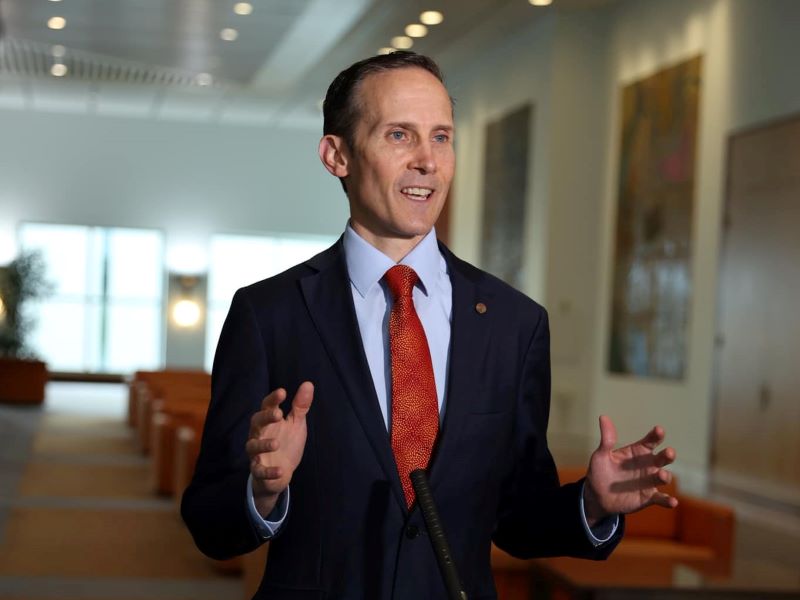Tech giants moving the “apparent location” of their “bits and bytes” production to minimise tax will face tighter rules under the Albanese government’s multinational tax reform package, which took a significant step on Friday.
Treasury released a draft plan to crackdown on large multinationals claiming tax deductions for payments relating to intangibles connected to tax havens like Bermuda and the Cayman Islands.
The consultation kicks off as Assistant Minister for Treasury Dr Andrew Leigh convened a multinational tax reform roundtable in Canberra, which included the OECD deputy tax commissioner and several local stakeholders.

Following the roundtable on Monday, Dr Leigh, an economist, said the government’s multinational tax reforms are consistent for all sectors, but singled out technology giants which have been under growing scrutiny for aggressive tax minimisation.
“They have the advantage over companies that produce physical goods, that it is easier to move the apparent location of production when you’re producing bits and bytes [rather] than physical products,” Dr Leigh said.
“But our aim is to create a set of rules which are consistent across the board.”
The Albanese government campaigned last year on a reform agenda to make multinationals pay their “fair share” of tax.
It includes adopting the OECD ‘Two Pillar Solution” for a modernisation of tax rules and a global effective tax rate of 15 per cent.
Domestically, the government will deter the use of tax havens for debt-loading and intellectual property exploitation with new tax rules.
In additional transparency measures, public companies will need to disclose subsidiaries, while large global companies will also need to disclose tax data on a country-by-country basis. When bidding for government work in Australia, the companies will also need to declare their country of tax domicile.
The economy-wide package, which will require several pieces of new legislation, will be felt heavily by many of the global tech companies operating in Australia, according to Centre for International Corporate Tax Accountability and Research (CICTAR) founder Jason Ward.
“The big tech companies are big users of this type of tax avoidance strategy,” Mr Ward told InnovationAus.com.
The nature of digital technologies means its relatively easy to transfer intellectual property between subsidiaries in different jurisdictions, he said.
“The intellectual property is completely transportable, movable, and you can even make it home anywhere you choose to really.”
Mr Ward said global tech and IT companies often do this to send royalties to lower taxing jurisdictions, minimising their total tax bill in Australia.
“[They are] parking intellectual property in a low tax jurisdiction and then using that to pay related party transactions, reducing taxable profit in Australia and shifting it to where it’s taxed very little or in many cases not even taxed at all.”
The Albanese government will introduce a bill to amend the Income Tax Assessment Act 1997 that introduces a new anti-avoidance rule with effect from July.
It is designed to deter the practice by preventing significant global entities from claiming tax deductions from it. Consultations on the draft will run for one month.
Dr Leigh, who is expected to also unveil legislation for the country by country reporting requirements later this week, said he wants companies competing on products and services, innovation and employee treatment, not by finding the next “boondoggle”.
“We don’t think it’s good enough for the tax system to stand still and to allow multinational companies to get away with shenanigans that see profits that ought to be taxed in Australia or transferred offshore,” he said.
Dr Leigh on Monday also touched on the government’s plan to force the companies that secure government contracts to disclose their country of tax domicile.
He said it would apply to tenders above $200,000 but wouldn’t prevent a company domiciled in a tax haven from securing the contract.
“That ensures a certain degree of public transparency and allows appropriate scrutiny of the tax affairs of companies which are receiving Australian taxpayer dollars for work. Companies won’t be banned because they’re in a particular tax domicile, but I suspect that transparency in itself will force some change in behaviour.”
Mr Ward, said it is a step in the right direction but CICTAR – which highlighted the issue with Microsoft last year — would like to see an actual ban on government tenders for companies engaging in aggressive tax avoidance.
“We welcome this as a first step. But it’s obviously not a good idea to continue to reward tax dodging multinationals with continuing government contracts.”
Do you know more? Contact James Riley via Email.

